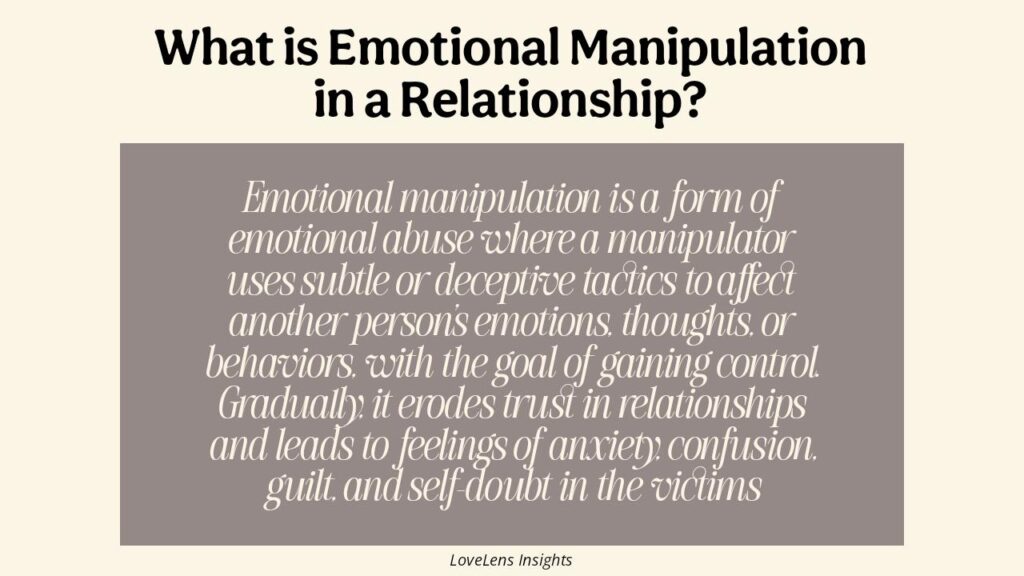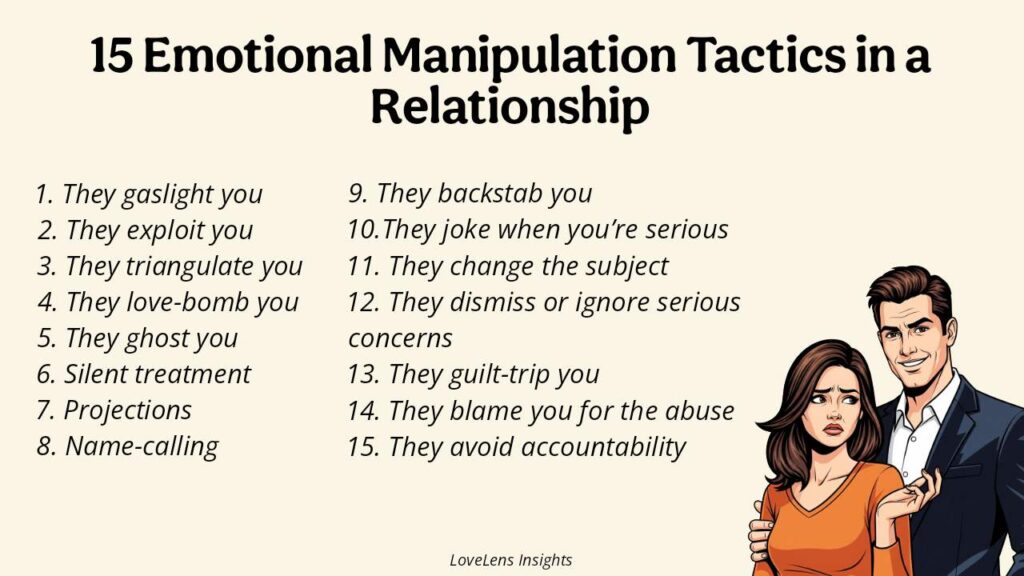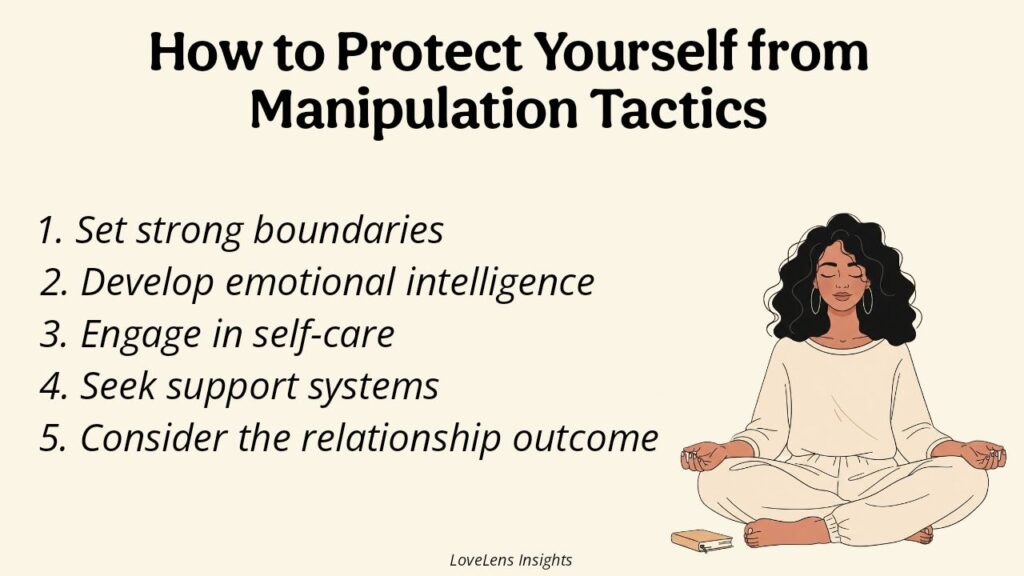You’re trapped in a relationship where your feelings are constantly dismissed or invalidated. Your partner excels at twisting words, making you question your sanity and reality. Isolation sets in as they subtly undermine your relationships with loved ones, leaving you feeling alone.
Doubt becomes a constant companion as you’re made to feel responsible for their emotions and actions. Their guilt trips and blame-shifting leave you perpetually apologizing, even when you’ve done nothing wrong. The joy in the relationship fades, replaced by anxiety and a desperate need for their approval.
But you’re not alone, and there’s a path to reclaiming your emotional well-being. This article will expose manipulative tactics and provide the strategies to break free and protect yourself.
Emotional manipulation is a form of emotional abuse where a manipulator uses subtle or deceptive tactics to affect another person’s emotions, thoughts, or behaviors, with the goal of gaining control. Gradually, it erodes trust in relationships and leads to feelings of anxiety, confusion, guilt, and self-doubt in the victims. A study revealed that the rates of emotional abuse are high, averaging around 80% in men and women, suggesting its high prevalence.
According to Paul Ryder, “emotional manipulation is not random, it is highly specific and even if the person who is doing it doesn’t know they’re doing it (which most don’t because it is a learned behavior and unconscious), it is still highly specific and targeted.”
Emotional manipulation can occur in various settings beyond romantic relationships. It can be within families, friendships, workplaces, educational environments, and even online interactions. In these contexts, individuals may use tactics like guilt-tripping, gaslighting, or passive aggression to influence others for control, advantage, or approval.
Emotional manipulation can be deeply confusing and hurtful. Tactics like gaslighting or guilt-tripping often leave people questioning themselves, feeling anxious, or even losing confidence. By learning to recognize these patterns, you’re better equipped to protect your emotional well-being and take a step back when the situation doesn’t sit well with you.
Manipulators often exploit personal boundaries to get what they want. When you’re aware of the signs, it becomes easier to stand firm, say no, and express your needs clearly. This is key to building relationships where both people feel safe, respected, and understood.
It can prevent things from getting worse. Sometimes, psychological manipulation is just the beginning, and if left unchecked, it can grow into more serious emotional or even physical abuse. Early recognition of these behaviors allows individuals to address the issues before they escalate, reducing the risk of entering, staying in, or healing from emotionally abusive relationships.
Here are 15 common manipulation tactics in relationships.

Gaslighting is a form of emotional manipulation where someone tries to make you question your reality. Let’s say you discovered your boyfriend is cheating via a message on his phone. If you’re the type who fails to remember vivid details, your boyfriend can deny this act upon confrontation and make you think otherwise.
He could call you “crazy” or dismiss your points as a joke. Little by little, you start to doubt your memory, feelings, or sanity. A manipulator does this to make you doubt yourself and change your own perceptions of reality.
An emotional manipulator identifies and takes advantage of another person’s vulnerabilities, positive traits, or emotions for personal gain. Individuals who prioritize harmony and approval may be exploited by manipulators who demand constant validation or compliance to maintain the relationship. For instance, they may have narcissistic personality disorder, where they exploit others to achieve their own goals.
The victim may also feel obligated to comply due to lack, guilt, fear, or a sense of responsibility.
This can lead to a power imbalance and feelings of resentment, as the exploiter consistently benefits at the victim’s expense, disregarding their needs and boundaries.
Third parties are usually involved to create jealousy or competition in relationships, thereby gaining control and manipulating emotions. This can generate feelings of rivalry and insecurity, compelling the affected parties to establish boundaries.
For example, a partner might mention the attention they receive from an ex to provoke jealousy in their current partner. Triangulation creates an imbalance of power and can leave the individual caught in the middle, feeling used and confused.
According to Dr Francesca Boccalari, “love bombing is a manipulative behavior where a person overwhelms another with excessive displays of affection, flattery, and attention to gain control over the relationship.”
While it may seem charming at first, the intention behind it is often to quickly build emotional dependence and trust. The manipulator creates an idealized version of love that the victim begins to crave, making them more vulnerable to control, setting the stage for later manipulation or withdrawal once the bond is firmly established.
Abruptly terminating communication without reasons allows the ghoster to avoid accountability for their actions or decisions, thereby creating feelings of confusion and insecurity in the victim.
By vanishing without a word, the ghoster exerts control over the situation and the victim’s emotional state, instilling a sense of helplessness in the affected individual. This manipulation not only undermines the victim’s confidence and self-esteem, but it also fosters dependency, as the ghosted person may replay past interactions, hoping to find clarity or reasons for the sudden disconnection.

Silent treatment involves deliberately ignoring or refusing to communicate with another to gain control or punish them. It’s not just about needing space, it’s a calculated withdrawal of attention and affection meant to make the other person feel anxious, guilty, or desperate to make amends.
This tactic often happens when there is a conflict in the relationship. Rather than speaking up, the manipulator resorts to silence as a form of punishment, subtly manipulating the situation for their benefit. This approach creates an emotional imbalance where the person on the receiving end feels confused and responsible for fixing a situation they may not even understand.
Emotional manipulation begins when the manipulative person takes what they feel and projects it to the other person to avoid how that makes them feel or look. For example, your partner could accuse you of cheating when they are the ones cheating. They project their behavior on you to reveal hidden information they can leverage to their advantage or create conflicts in the relationship.
A manipulative person will often label the victim’s personality traits or behaviors with negative names, harming their emotional health. The purpose of this is to make the victim believe they are less, and to subtly convince them that they aren’t worthy of better treatment. This often starts in small, less offensive ways, and builds in intensity and frequency as the victim becomes more accustomed to the name-calling.
The deceitful act of betraying someone’s trust or confidence after presenting oneself as a friend or ally usually arises from ulterior motives, often aimed at personal gain or intentionally harming the victim.
For instance, Sarah pretends to be Jenna’s supportive friend while secretly backstabbing her by dating her ex-boyfriend and sharing private information about her. This betrayal damages Jenna’s trust and reputation, allowing Sarah to advance her own social status while maintaining the appearance of loyalty and support.

The use of joking to mask serious intentions or hurtful remarks often happens when someone says something offensive but quickly follows it up with, “I was just joking,” if the other person reacts negatively. It creates a relationship imbalance where one person feels free to say whatever they want without consequence, while the other is left doubting themselves and feeling silenced.
In conversations, rather than discussing the intended topic, the manipulator employs this passive-aggressive strategy to control the victim, especially after the victim makes a valid point or receives a compliment.
By abruptly changing the topic, the manipulator effectively dismisses the victim’s contributions, preventing them from gaining confidence. This tactic ensures that the victim becomes increasingly reliant on the manipulator for affirmation, leading them to doubt their own abilities and intelligence.
When manipulators employ this tactic, they trivialize the victim’s expressions of anxiety, fear, or dissatisfaction with indifference or outright denial, suggesting that the victim is exaggerating.
In another case, when their victim makes a valid contribution in group discussions or experiences success, a manipulator may respond with dismissive comments to undermine the victim’s achievements. This tactic serves to maintain control by suggesting that the victim’s contributions are unworthy of attention.
Guilt-tripping is a manipulative tactic that exploits a person’s sense of responsibility to control their behavior. It involves making someone feel accountable for negative outcomes or using their insecurities against them.
Manipulators often make the victim feel guilty or ashamed for expressing their needs or setting boundaries, portraying them as selfish or ungrateful. As a result, the victim may comply in an attempt to relieve the guilt and prove their worth.
Manipulators can also shift the blame to their victims, creating a narrative that makes them feel responsible for the abuse. This tactic can manifest through statements that suggest the victims provoked the abusive behavior, fostering confusion and self-doubt in them.
Gradually, this can lead to a cycle of emotional distress, as the victims struggle to recognize their own worth, leaving them second-guessing their actions to avoid a negative interaction with the manipulator.
Emotional manipulators evade responsibility for their actions and maintain a position of control within the relationship. This often manifests as denying involvement, even in the face of clear evidence, or minimizing the impact of their behavior, claiming that the victim is overreacting.
Imagine encountering someone who always seems to know exactly what to say to get you on their side. At first, they might seem to understand you, offering support and making you feel valued. These individuals are often driven by a need to be in control and are good at subtly steering situations to their advantage. However, you might notice a pattern: they always seem to benefit the most from your interactions.
For instance, in a relationship, a woman tells her partner, “If you really loved me, you wouldn’t go out with your friends so much.” Gradually, her partner starts to feel guilty for wanting personal time and begins to distance themselves from their friends to prove their love. The woman, in this case, is particularly guilt-tripping, to control her partner’s actions and isolate them, with the goal of gaining emotional control by making the other person feel bad or selfish for having their own needs and boundaries.
Also read: 7 Conflict Resolution Strategies in a Relationship
If you have experienced emotional manipulation, here are the strategies for protecting your emotional well-being:

Protecting yourself from emotional manipulation starts with establishing clear and firm boundaries. First, you understand your personal values, needs, and comfort levels. Next, take the time to reflect on which behaviors are acceptable in your relationships and which ones make you feel uncomfortable or violated. Clarity on these aspects is the foundational step towards protecting your well-being.
Don’t shy away from saying “no” when a request oversteps your boundaries. Be firm and consistent with it, even if the manipulator tries to guilt-trip or pressure you. By mastering the art of concise refusal, you maintain control over your time, energy, and emotional space, reinforcing your boundaries and discouraging manipulative behavior.
Safeguard yourself from manipulation by developing emotional intelligence. Pay close attention to your feelings in various situations and around different people. Do you notice recurring feelings of anxiety, discomfort, guilt, or resentment? These emotions can serve as warning signs, signaling potential manipulation attempts.
Beyond self-awareness, emotional intelligence also involves understanding the emotions of others. While mind-reading is impossible, strive to gain insights into others’ perspectives by active listening and observation, to discern their true intentions and see through potential manipulative tactics.

Prioritize your physical and mental well-being, as it helps you build resilience and reduce your susceptibility to manipulative tactics. Engaging in self-care involves making conscious choices that nurture your overall health and enhance your ability to navigate challenging relationships.
You can start by focusing on the fundamentals, ensuring you get adequate sleep, nourishing your body with healthy foods, and engaging in regular exercise. Incorporate enjoyable activities into your routine, which could involve reading a book, spending time in nature, or pursuing a hobby. This practice enhances your self-awareness, allowing you to identify your own patterns, triggers, and emotional vulnerabilities.
Actively seek connections with people you trust, who can offer a safe space to share your experiences and feelings without judgment. These individuals can provide invaluable support, perspective, and advice based on their understanding of the situation. Sharing your burdens with trusted friends and family members can alleviate stress and help you gain clarity on your experiences.
Seek professional help from therapists and counselors who are trained to provide guidance and support for dealing with manipulative individuals and healing from emotional abuse. For instance, a mental health professional can help you develop coping mechanisms, process your experiences, and rebuild your self-esteem. Their perspectives can help you validate your feelings and make informed decisions about the relationship.
A healthy relationship fosters mutual growth and support, while a manipulative one thrives on imbalance and control. If you are being consistently guilt-tripped, gaslighted, or made to feel responsible for the other person’s emotions, then it’s time to assess the overall health and balance of the relationship.
Be willing to distance yourself or end the relationship if necessary. This can be difficult, especially if you care about the other person, but your well-being must be your top priority. Accept that you cannot change the manipulator, but you can only control your own behavior and choices. Focus on protecting yourself, set healthy boundaries, and build a life that supports your own happiness and well-being.
Here are some key takeaways to remember about emotional manipulation:
Emotional manipulation is a form of emotional abuse where someone exploits your feelings to influence and control your behaviors to their advantage.
Emotional manipulators are individuals who use indirect or deceptive tactics to influence or control others for their personal gain. They may not always appear harmful or aggressive; they can seem charming, helpful, or even caring at first. However, they prioritize their needs above others.
Emotional manipulation can be in the form of constant criticism and blame, attempts to distort your reality through gaslighting, and playing the victim to arouse sympathy. Manipulators may also withhold affection, triangulate relationships, or use emotional blackmail to control you.
Protect yourself by setting boundaries and practicing self-care to recognize and resist these tactics. If necessary, seek support and distance yourself from manipulative relationships to safeguard your well-being.
You have to set strong boundaries and be assertive to respond to emotional manipulation. Manipulators are crafty, but your boundaries will allow you to recognize the manipulation and communicate your needs clearly.


